|
In St. Peter’s speech at Pentecost he proclaims, “But God raised him up, releasing him from the throes of death, because it was impossible for him to be held by it.” (Acts 2:24) The truth of St. Peter’s words is made manifest in the liturgical rhythm of the Church year. Just as our Lord could not be held by the grave, the celebration of Easter cannot be held to just one day. In her beauty, the Church does not stop at the Octave of Easter either, but offers the faithful an entire liturgical season—50 whole days—to glory in Jesus’ resurrection. As Pope St. John Paul II declared, “We are an Easter people.” But once the beautiful liturgies of the Octave are behind us, the Easter lilies are removed from the churches, and the carrot cake has all been eaten, how are we to be an Easter people?
One good place to begin is entering into the celebration of the liturgy. I have a distinct childhood memory of attending Easter Sunday Mass while my family was away on spring break. During the homily the priest invited everyone to exclaim ‘alleluia!’, and then do it again because we weren’t enthusiastic enough. As an unobservant and not-the-best catechised child, the purpose of this exercise was lost on me. But now, as a frequent daily Mass attendee I am much more aware of the forty long, alleluia-less days of Lent and more fully appreciate the significance of proclaiming alleluia together with renewed vigor on Easter and in the days that follow. During Lent many of us are motivated to make more time for Mass or prayer in our lives, which are beautiful practices to continue through the Easter season and beyond. Throughout the Masses of the Octave, the Victimae paschali laudes, an ancient chant, may be recited before the Gospel. Whether you attend Mass and hear the chant or simply take time to meditate on it each day, it is a beautiful tool for reflecting on the Paschal mystery in our lives and offering extra praise to the Lord: “The sheep are ransomed by the Lamb; / and Christ, the undefiled, / hath sinners to his Father reconciled.” Just as Lent is a time of remembering our mortality, Easter can be a time of remembering our Eternal life. Another liturgical tool to draw on is the Liturgy of the Hours, the communal prayer of the Church. In Morning Prayer throughout the Octave, we use the same psalms and canticle of Easter Sunday morning for all eight days. Particularly striking is the Canticle of Daniel (Daniel 3:57-88, 56), in which we pray that all things on Heaven and Earth bless the Lord: Let us bless the Father, and the Son, and the Holy Spirit. Let us praise and exalt him above all forever. Blessed are you, Lord, in the firmament of heaven. Praiseworthy and glorious and exalted above all forever. Whether you are able to pray Morning Prayer, or any of the other hours, in community or humbly pray them alone, you are still raising your prayers with all the faithful throughout the Earth and elevating them through Jesus to the Father. Throughout the Easter season, the first readings at Mass are taken from the Acts of the Apostles. Practically this makes sense since Acts recounts the events following Jesus’ death and resurrection. But there is also a spiritual significance to reading from this book during the Easter season. Just like His first disciples, we aren’t meant to keep our alleluias and joy in the Lord’s resurrection and salvation confined to our churches or to ourselves, but to proclaim them to the world. It took a little encouragement for the apostles to do this, and so it may for us, but we too can say with St. Peter: “He commissioned us to preach to the people and testify that he is the one appointed by God as judge of the living and the dead. To him all the prophets bear witness, that everyone who believes in him will receive forgiveness of sins through his name.” (Acts 10:42-43) The Easter season is a grace-filled time to unite ourselves to this age-old mission of the Apostles and share the Good News of Jesus. The Catechism of the Catholic Church tells us that, “Beginning with the Easter Triduum as its source of light, the new age of the Resurrection fills the whole liturgical year with its brilliance.” (Paragraph 1168) At the Easter Vigil, the faithful are invited to renew their baptismal promises and remember the light of Christ that is within them. As we make our way through the Easter season, let us glorify Christ in the liturgy and let the brilliance of the Eternal Light shine forth from our churches and our hearts.
0 Comments
Holy Week is one of my favorite weeks of the year; each of the days builds with anticipation and I get excited just by the thought of Easter Sunday. Lent is almost through and it’s almost time to be joyful in the Risen Lord. When I was little, I felt this anticipation and excitement too. I would spend Holy Week letting people know that Easter was only a couple short days away—it felt like spring would officially be here as soon as we woke up on Easter Sunday! “The very best holiday of the year” was coming, and I had to get ready for it! Did I fully understand it was Christ that I was waiting for or did I just want to wear my new white shoes for church? Looking back, although it could have been the new Easter shoes, I think my 10 year-old-self would have agreed that I really was waiting for Holy Week as the final stretch to the finish line on a journey that began on Ash Wednesday.
In today’s Gospel reading, we read about moments of betrayal and loyalty. Judas leaves the Last Supper to betray Jesus while Peter in his humanity says that he will never deny him. I find it to be one of the most powerful Gospels of Holy Week. Here’s why: Like Peter, we are called to be disciples whose repentance leads to an experience of God’s forgiveness. Jesus knows that his friends will betray him and that he has limited time left on Earth. On one hand, Judas tries not to be obvious about his deception as he leaves the table, and on the other hand, Peter publicly tells Christ that he will stand by him and never fail him. Ultimately, both men betray Jesus, but it’s Peter who seeks forgiveness and allows himself a second chance. Judas, on the other hand, is overcome with guilt and despairs that his sin is beyond the reach of God’s mercy-- eventually taking his own life. We are like Peter in so many ways! We say we love Christ and that we could never deny him, but at the first sign of pressure we sin and turn our backs on him. How often have we chosen to do something that pulls our hearts from Jesus? It is during Lent—especially during Holy Week—that we recall the pain we’ve caused Christ. This week and each day, Jesus gives us another chance to say to him, “Forgive me; I have sinned.” When Christ meets his disciples after his Resurrection, he asks Peter, “Do you love me?” Let us respond with Peter this Easter, “Yes Lord, you know that I love you!” As Easter approaches, we remember how much we are loved by Christ in his Passion, death on the Cross, and soon to be Resurrection. In these next few days, I challenge you not to say, “Lord I could never deny you!” but instead, “Forgive me Lord, for I have sinned.” Last year on Good Friday, Pope Francis said, “Lord Jesus, always grant us the grace of holy repentance...the spark of hope is lit in the darkness of our despair, because we know that your only measure for loving us is to love us without measure.” This Holy Week, in this time for “holy repentance,” let us make sure to spend these last days in Lent with our hearts preparing for Easter. May we use these remaining days in the desert as a time for forgiveness and allow our hearts to be loved by Christ. May all of our hearts gleam with anticipation for Holy Week and better knowledge of the Risen Lord! **This blog was originally published on April 16, 2019.** 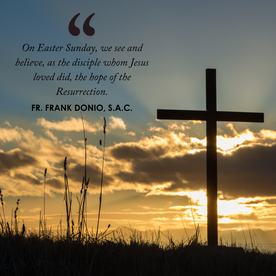 The time of the Paschal Triduum and the Easter season are almost upon us. How has the time of Lent been? It is meant to be one of ongoing conversion to Christ – metanoia. The Triduum offers us a deeper time of conversion. The Gospel readings of those days give us much to reflect on our own discipleship of Christ. On Holy Thursday, during the Mass of the Lord’s Supper, we experience table fellowship, the first Eucharist, and the witness of Christ in service to his Apostles through the washing of the feet. It is an example that we are called to follow. During the Commemoration of the Passion of Our Lord Jesus Christ, we hear of the betrayal of Judas, the denial by Peter, the suffering of Jesus, and the grief of those at the foot of the Cross, especially the Blessed Virgin Mary. In what occurs, we consider the ways in which we have not lived for Christ and how we can unite our suffering to his on the Cross. At the Easter Vigil, in the announcement of the angel to Mary Magdalene and the women at the tomb, we learn about the possibility of eternal life given to us all through the Risen Christ. On Easter Sunday, we see and believe, as the disciple whom Jesus loved did, the hope of the Resurrection. In this hope, we proclaim the Risen Christ as Savior of the world! Metanoia, ongoing conversion, is a patient journey that leads to our true joy, deeper encounter with the Risen Christ! May the charity of Christ urge us on! May you have a blessed Paschal Triduum and a joyous Easter! In God, the Infinite Love, Fr. Frank I often find myself avoiding sad and painful things, searching to find a silver lining and help make me or someone else feel better. It can be at the cost of seeming empathetic, too, like avoiding sitting with the pain and instead dealing with it head on. My immediate reaction is to fix something broken or to solve a problem instead of to actually let it sink in and affect me. Growing up, this was a coping mechanism that I’ve been able to turn into a strength of mine as a teacher, making split-second decisions and problem-solving throughout the day. Personally though, I think I need to wrestle with it. As we enter into the saddest, most heart-wrenching day of the year, my gut says “avoid the topic, think about Sunday,” but instead I’m going to go a little deeper for Good Friday this year.
Good Friday was what I can only imagine to be a marathon of a day for Christ to endure, only to end with his sacrifice in the Crucifixion. The brutality and agony that he must have felt while carrying his cross can be overwhelming to think about. He carried it bleeding, tired, hungry, and aching from the weight of such an enormous cross. I’ve never experienced pain like that, so I’ve found it easy to skip through, acknowledging it happened and moving on. But this is where I’ve gotten it wrong: Christ did all of that for me, for us, for every human being on this Earth. Jesus did that so we wouldn’t have to experience it for ourselves and could be together with God in his Kingdom one day. This day is the one I shouldn’t overlook. The Stations of the Cross, a 14-step reflection on the Passion of Christ, is the perfect place for me to start contemplating Christ’s sacrifice on Good Friday. While there are many versions of this devotion, I’m using the Stations of the Cross in the Spirit of St. Vincent Pallotti to help me think more clearly about the meaning of Good Friday. There are many different Stations of the Cross to use depending on your spirituality, vocation, or age. In my classroom I like to use a coloring book version and when I taught 2nd grade, we liked this one for children. For this year’s study, I think I’ll also try this Scriptural Stations of the Cross from the USCCB’s website, located on the Catholic Apostolate Center’s resource page as well. I hope to think more deeply and clearly about the Passion of Christ and appreciate a little more heavily the price he paid for me, everyone I know, and beyond. There are many signs throughout this Triduum that we can think about in addition to praying with the Stations of the Cross. Tonight on Holy Thursday, the tabernacle was emptied and colored cloth was placed there instead. There will be no consecration of the Eucharist until the Easter Vigil and instead of Mass, we pray, remember, and venerate the Cross. The color for Good Friday’s services changes too: red is now the color we see and use to remember his blood shed for us. Red was also the color used on Palm Sunday, when Jesus made his way through palm branches on a donkey into the City of Jerusalem in joyous celebration. These signs in church help us remember all that Christ did for us. We may take his sacrifice for granted possibly because it is easier to avoid the sad and scary realities about the time between Jesus’ arrest and Easter morning. We also may be too “busy” to stop and reflect on not just the happy moments when Jesus was teaching, but also how he gave His life to save ours. In our lives, we must continue to appreciate and enjoy the good parts of Christ’s life and ministry. We can live knowing that the end is happy and He is Risen on Easter morning. But without Good Friday, we wouldn’t have Easter Sunday. Tomorrow on Good Friday, I invite you to join me on this sad and painful day as I look more deeply at the Stations of the Cross. For additional resources, please visit the “Additional Lenten Resources” page on the Catholic Apostolate Center page. Next week is Holy Week. Before we arrive there and enter the most solemn of days of the Church year, the Easter Triduum, we come to another Solemnity during the Lenten season. Last week, it was the Solemnity of St. Joseph, spouse of the Blessed Virgin Mary and patron of the Universal Church. Tomorrow, it is the Solemnity of the Annunciation of the Lord. Both offer us examples of how to respond to God’s action in our lives. The Blessed Virgin Mary and St. Joseph responded freely and fully to God’s invitation announced by the angel to move in directions that they did not expect. While we may not have an angel announcing God’s will for us, in what ways do we discern the direction that we are called to take? Recently, I attended the religious profession of a Benedictine monk who is a former student of mine. Some of those who attended the Mass and profession ceremony in support of him were also former students who are now either diocesan or religious priests or married with children. (Some are also former staff members and collaborators of the Center.) Each in their own way has followed God’s invitation to them. In and through their chosen vocations, they have found joy in living more deeply their Christian life.. While they have found joy, they also know what it means to take up the cross and follow Jesus Christ as his disciples. None of them made the choices that they did easily, but did so through cooperation with the grace of Christ. We are called to the same. Holy Week offers us an important opportunity to reflect, discern, and act on God’s will in our lives. Join us on social media for our Virtual Holy Week retreat. We offer it as a way of doing this type of discernment in the context of this most solemn time. Please know that our prayers are with you, especially during the Easter Triduum and season. May the charity of Christ urge us on!
The ashes of our Lenten journey were more pronounced this year—not fading with Ash Wednesday but thickening in the following weeks with the outbreak of COVID-19. Each of the plans we had for Lent—the sacrifices, the resolutions, the acts of charity—were rearranged, making room for more sacrifices than we thought possible. We sacrificed control, physical freedom, the assurance that our pantries would be stocked or that our bank accounts would be replenished. We sacrificed our physical friendships, birthday celebrations, anniversary milestones, family vacations, date nights. We’ve lost friends, family, or neighbors to a virus that until a few months ago was hardly known about or discussed. We’ve sacrificed our liturgical lives, being able to receive Christ’s Body and Blood in the Eucharist, attendance at weddings or baptisms, pastoral formation, the journey into the Church on Easter via RCIA. Pope Francis likens this pandemic to the evening storm experienced by the disciples in the boat, saying, “For weeks now it has been evening.” This evening has been long, dark, full of the unknown. Throughout this “evening,” we have had to confront our vulnerabilities and experience our littleness. We’ve had to realize that without light, we cannot see. Perhaps we’ve grappled with fear in this darkness—a fear of the unknown, a fear of isolation, a fear that the dawn may never come. Perhaps our minds have been left to imagine: Lord, “Do you not care that we are perishing?” This time of quarantine, social distancing, and pandemic has been our evening storm which, “Exposes our vulnerability and uncovers those false and superfluous certainties around which we have constructed our daily schedules…shows us how we have allowed to become dull and feeble the very things that nourish, sustain and strengthen our lives and our communities… [and] lays bare all our prepackaged ideas and forgetfulness of what nourishes our people’s souls.” We thought “we would stay healthy in a world that was sick,” but the storm has awakened us from our personal slumber. And we need light. This realization is the seed of faith—a faith which recognizes the need for salvation, for one another, for the light of God. The realization of our littleness, our helplessness, our dependence, our mortality, is the perfect place from which to enter into the Triduum and await the lighting of the Easter candle—the Resurrection of Jesus Christ. God has provided flickers of hope, reflections of grace, throughout our journey at sea: livestreams of Masses, daily Scripture reflections, broadcasts of Adoration, priests hearing Confessions in drive-thrus, virtual retreats, Pope Francis’ blessing of the entire world. We have seen a “creativity of love”--the production of ventilators in car factories, the making of masks in workplaces, the donations of money, food, and supplies across the world, the video chats to those in quarantine facing death alone. We see dancing from porch balconies. Teddy bears in windows. Embraces in hospitals. Birthday drive-bys with signs and honking. People on their knees. Yes, the light of Christ exists even in the darkness. And the darkness has not, and will not, overcome it. It will shine ablaze all the more radiantly this year in the midst of our utter darkness, sparkling in the gloom. The darker the night, the better able we are to see the light. And in the darkness, we look up. Let us welcome the light of Christ this Easter by first lighting his love in our hearts. When Christ’s life lives within us, we can enkindle it in the souls of others and set alight all we encounter. “Prayer and quiet service: these are our victorious weapons,” Pope Francis reminds us. Wake up, Lord! The disciples shouted in the midst of the storm. Wake up, Lord! The world shouts again today. Let us awaken the Lord through our prayers and service. Through our acts of charity to those suffering, tired, or scared. Through our cries and supplications. Through our fasting in these unwelcome sackcloths and seemingly perpetual ashes. Cry out with me again this Triduum, “Wake up, Lord! We are perishing.” Christ’s response to our cries this week is open arms embracing us through nails and scourging. His response to our cries is a head beaten, bruised, and crowned with thorns. His response to our cries is silence to jeers, taunts, mockery, and abandonment. His response to our cries is the relinquishing of his spirit in atonement for our sins and those of the whole world. He who cried out to his Father, “my God, my God, why have you forsaken me?” also knows the darkness intimately. He knows what it feels like to be alone and perishing. But by his words do we find the light: “Why are you terrified? Do you not yet have faith?” ….“My Father…not as I will, but as you will.” Our cries are never unheard. “The Lord awakens so as to reawaken and revive our Easter faith,” Pope Francis said. “We have an anchor: by his cross we have been saved. We have a rudder: by his cross we have been redeemed. We have a hope: by his cross we have been healed and embraced so that nothing and no one can separate us from his redeeming love.” The goal of our Lenten journey is transformation—to be transfigured. This is also our prayer throughout this pandemic. Yes, we pray that it ends, that healing comes, that daily life can resume, that economies will be restored, and that suffering will cease. But even more than all of that, we pray for transfiguration. Because when we are transfigured by the love and light of Christ, when our faith has awakened and we have realized our need for salvation, then the storm can rage on while we rest knowing we will not perish—for we will know deep in our hearts that with the “dawn there is rejoicing.” Then, and only then, “In the silence of our cities, the Easter Gospel will resound.” For more Easter and Lenten resources, please click here. For more resources and reflections on COVID-19, please click here. At the time I’m writing this post, daily life as we’re used to has been turned on its head as a result of the COVID-19 global pandemic. Non-essential businesses are closed, usually busy streets are empty, many schools and workplaces are operating remotely—if at all—and people everywhere are isolating themselves and thinking about supplies. Perhaps most striking are the extraordinary measures the Church is taking to slow the spread of the coronavirus: public celebrations of Mass are suspended, as are any number of RCIA, seminary, and parochial academic and sodality programs, and any sacramental celebrations that had been planned can only take place with minimal attendance. While the faithful have been dispensed of the obligation to attend Sunday Mass, we can’t help but feel a growing hole in our hearts which can only be filled by lovingly receiving our Lord in the Eucharist. This was not the Lent any of us had been expecting— certainly we are all giving up more than we had bargained for!
Does this remind anyone of Holy Saturday? Holy Saturday allows the faithful to pause and meditate upon the emotionally heavy commemoration of the Lord’s Passion and Death on Good Friday before rejoicing in the glorious joys of Easter Sunday. Holy Saturday is strange because no Masses are celebrated anywhere on the planet and the faithful find ourselves waiting for the Easter dawn when we can rise from having humbled ourselves through the Lenten practices of prayer, fasting, and almsgiving. These days may resemble Holy Saturday for all who are waiting in isolation from the outside world. Like the Apostles’ experience of the first Holy Saturday, we are all resigned to waiting: for positive news about testing and treatment for the virus, yes, but also for the reopening of schools, businesses, and churches, and for being able to rekindle relationships in person. Still, we recall we are not done with Lent yet. However our Lenten spirituality has been affected by self-quarantining, the liturgical life of the Church continues despite the virus. Our churches may be devoid of public celebrations, but the Church Universal endures and can adapt, using the tools of the times to evangelize and to address the yearning of our hearts, souls, and very beings. The Church, after all, is more than the sum of her buildings, real estate holdings, art, music, and writings—she is alive in each of us as we continue our Lord’s earthly ministry by serving one another in love, compassion, and mercy. There are plenty of reasons to hope. We see online reports of priests who, out of love and care for their people, broadcast their celebrations of the Holy Mass through the Internet or radio, adapting scheduled hours in the confessional, Lenten reflections and observances, and Eucharistic Adoration in ingenious ways (such as from cars), and connecting many to available life-sustaining resources. Let’s lift up in prayer our priests who continue to lay down their lives for others, especially for the sick or dying, and who continue to shepherd their people throughout this unprecedented time. Let us also consider offering them a token of appreciation; we must never take them for granted! The faithful are benefitting from the love of our priests despite not being able to see them as usual. We are discovering all sorts of new spiritual resources developed by generous catechists and are finding ways of caring for our neighbors’ spiritual, emotional, mental, and physical needs. We remain united in faith, hope, and charity as we navigate these days of uncertainty and waiting. Nevertheless, we have unique opportunities for personal growth this Lent and Easter: bringing others into a new encounter of trust and peace with Jesus Christ and His Church. Similar to the experience of the early Church facing threats to their very existence, we may not have open parishes at the moment, but we nurture and care for the domestic churches of our friends, families, and loved ones. We are one Church—pursuing holiness and the same heavenly destiny—assured by the Almighty Himself of the ultimate victory over evil and death which is the Easter rising of the Son: “I am the resurrection and the life; whoever believes in me, even if he dies, will live, and everyone who lives and believes in me will never die.”[1] For more resources to accompany you throughout the Lenten and Easter seasons, click here. For more resources to accompany you through the COVID-19 pandemic, please click here. [1] John 11:25-26, cf. Revelation 1:17-18. \We are once again in the midst of the liturgical season of Lent. These forty days before the Triduum are opportunities to prepare ourselves to enter into the Passion of Christ through penitential practices such as prayer, fasting, almsgiving, and self-sacrifice. Done correctly, our Lenten practices can be cathartically cleansing as we imitate Christ’s forty days in the desert after His baptism. This incredible withdrawal of the Lord from the outside world to dwell on the calling of His Heavenly Father before the commencement of earthly ministry remains a model for us all. During Lent, the faithful do not isolate themselves from the world in fear but rather draw strength from Christ. Shaking off the comforts and complacencies of living in the world may be a bit jolting, but our ultimate goal is holiness; anything else is just a noisy distraction which can never truly satisfy our deepest desires. Today, technology has become integrated into our lives and relationships. Social media, the internet, and the incredible utility of our smartphones may occupy a large part of our daily attention. It’s no wonder we can find it harder to disconnect from the outside world. Indeed, while the proper and moderated use of technology can be beneficial, observing the dangers of failing to unplug from the world (i.e., harming real human connections), has helped deepen my appreciation for the isolation opportunities afforded by Lenten observances. Lent calls each of us to remember the ultimate sacrifice God Himself made on Good Friday. This salvific act is so significant that it cannot be restricted to just one day on the liturgical calendar. The Church commemorates Jesus’ Last Supper, Passion, and Death during the Triduum. As these days draw near, the faithful are called to prepare themselves to enter into the Paschal Mystery by putting aside our worldly comforts and imitating how our Lord spent precious time among His disciples before His death. While Lent is an increased time of preparation and time of intentional growth in holiness, the Church has no shortage of opportunities to deepen our relationship with the Lord year-round. Sunday Mass offers us the spiritual nourishment and proper grounding to start each week. The choices we make in the hours or days following Mass can build upon the scriptural and sacramental foundations laid during the service. Recommitting ourselves to our families and their needs can strengthen the love binding us together; praying with and serving each other builds up the domestic church. For example, volunteering to lead devotional prayers together as a couple or family is a beautiful expression of intimacy and faith. Additionally, during Lent and beyond, we may replace screen time with spiritual reading so we can be inspired by the writings of saints or theologians and discover new avenues of holiness for our lives. Certainly, we can sacrifice a worldly comfort during Lent, but we can also perform charitable works and make a difference in the lives of others during this season. Lent is not a diet! Lent is intended to bring us closer to God, Who is found not in the noise of the world, but in the quiet whisperings of an open heart. Prayer enables us to make room in our hearts for Him to dwell in the temples of our bodies and radiate through our lives. We cleanse ourselves of distractions that prevent us from the holiness He calls us to and we commit ourselves to prayer, fasting, and almsgiving. We repent of our sinful shortcomings and avail ourselves of the sacraments of the Church. Our desire to accompany our Lord can be fulfilled by our faithful vigilance in Eucharistic Adoration, especially in the nighttime hours when our “spirit is willing, but the flesh is weak.” Our Lord is present in the Eucharist we receive at Mass, the Sacrament we adore, the family we are a part of, and the people we serve. He is always ready to not just be a relegated part of our lives, but the core of our very being. The season of Lent can serve to motivate us to choose the better part rather than be complacent in the empty comforts of the world. Though we seek isolation from the distractions of the world to accomplish a meaningful and fruitful Lenten observance, we are promised by the Lord God Himself that we never walk alone when he says: “I am with you always, until the end of the age.” For more resources to accompany you throughout your Lenten journey, please click here. Are you tired of the feasting? We are at the tail end of feasting after the Easter season with the celebration of the Solemnity of Corpus Christi last Sunday. We experienced the 50 days of Easter, the Solemnity of the Ascension of the Lord, Pentecost, the Solemnity of the Holy Trinity, and finally, the Solemnity of Corpus Christi. In my family, we have partaken in a fair share of feasting on treats, and I am almost ready for a period of fasting again. The transition from the Easter season into Ordinary Time can lead to a misunderstanding of what the Church is calling us to during this liturgical season. It is easy to see Ordinary Time as boring or as a time for laziness, but if we look at the liturgical calendar and journey along with the Apostles in the Scriptures, we can see that it is just the opposite. Reflecting back on the Scriptures read during Lent and the Triduum, we see the disciples’ confusion about what Jesus was preparing them for. He warned them often that He had to suffer, die, and rise, and yet they were still in hiding and unsure of their mission after the crucifixion and Resurrection. Scripture states that they were locked in the Upper Room in fear of the Jews after Christ’s death and then that they were left “looking intently at the sky” after Christ’s Ascension. It is not until Pentecost, when the Holy Spirit descends upon the disciples, that the gift of understanding is given to them and they are able to go forth and spread the Gospel message. In celebrating the Solemnities of the Ascension and Pentecost after Easter Sunday, we come to understand our role as Christians on mission. We are reminded that we too are equipped with the Holy Spirit for the call to go out to all the nations and proclaim the Good News, baptizing in the name of the Trinity. We next celebrate the Solemnity of the Holy Trinity, a day to contemplate that the Holy Trinity is relationship itself, and we are invited into that relational exchange of love among Father, Son and Holy Spirit. As the Catechism explains, "By the grace of Baptism ‘in the name of the Father and of the Son and of the Holy Spirit,’ we are called to share in the life of the Blessed Trinity” (CCC 264). This Solemnity invites us to ponder the vastness and majesty of God in three persons and His great love for His creation. Finally, the Church celebrates the Solemnity of Corpus Christi (Latin for “Body of Christ”). Christ, after the Ascension, remains with us in the bread and wine transformed into His Body and Blood during the celebration of the Mass. This Solemnity focuses our attention and hearts on the greatest gift to the Church: the Body, Blood, Soul and Divinity of our Lord in the Holy Eucharist. Together with the celebration of the other feasts after Easter Sunday, the celebration of Corpus Christi is a moment of grace given to us today that propels us into this season of Ordinary Time. If we look at the calendar, the Church has been preparing our hearts to enter into this celebration of Corpus Christi. We needed Jesus to establish the Eucharist (Holy Thursday), to suffer, die and rise (Triduum), to return to the Father (Ascension), and to send the Church an outpouring of understanding for Her mission through the Holy Spirit (Pentecost). As a result, we can ponder and enter into the life of the Holy Trinity (Solemnity of Holy Trinity). All of these feasts prepare the Church for the Solemnity of Corpus Christi and for our journey into Ordinary Time. The Holy Eucharist is the strength for our journey in the ordinary. The Body and Blood of Jesus assists us in following the will of God as we receive God Himself. The Solemnity of Corpus Christi can be celebrated with hope that Jesus is with us in this Holy Sacrament, and the Church is calling us to continued growth in Ordinary Time. Questions for Reflection: How can you use Ordinary Time in order to grow in your faith? What graces from Lent and Easter can help propel you into Ordinary Time? We are about to enter into the holiest days of the Church’s liturgical year, the Easter or Paschal Triduum. The Lenten season, our time of preparation, will fade away into the spiritually intense days ahead. We know the story and how it ends. The disciples and Apostles of Jesus did not know and did not understand. That would come later. While we may know, do we truly understand? We are called to embrace fully and completely in our minds and hearts the basic Christian proclamation, the kerygma, that Pope Francis summarizes in a single sentence:
“Christ, out of love, sacrificed himself completely in order to save you.” (Christus Vivet, 118) Have we done so? We can learn many things from the Catechism or from Theology. We can do good through works of charity and justice. We can participate in many ritual actions of worship. It is all meaningless without trusting faith in Jesus Christ as our loving Savior who has risen from the dead and is alive today! Again, from Pope Francis: “See Jesus as happy, overflowing with joy. Rejoice with him as with a friend who has triumphed. They killed him, the holy one, the just one, the innocent one, but he triumphed in the end. Evil does not have the last word. Nor will it have the last word in your life, for you have a friend who loves you and wants to triumph in you. Your Savior lives.” (Christus Vivet, 126) May you have a blessed Easter Triduum! Holy Week can be the most emotionally intense period of the liturgical year. Beginning with Palm Sunday, we notice some changes to the usual liturgy, namely: the opening reading, the much longer narrated Gospel, the red vestments, and the presence of blessed palms. As the week continues, our anticipation may be building towards an emotional peak, probably the commemoration of Christ’s death on Good Friday or His Resurrection on Easter Sunday. We may be tempted to take it all in stride and grimace at the raw details of Jesus’s sacred Passion while holding on for the joys of the Easter proclamation. We are, after all, the “Easter people and Alleluia is our song,” according to St. John Paul the Great. I have found myself guilty of this detachment sometimes and now propose, as we have already entered Holy Week, that we immerse ourselves into the intense details—that raw, human emotion—of the Triduum in order to accompany Christ more closely during the most significant moments of His earthly ministry and the fulfillment of salvific history.
On Palm Sunday, we celebrate the entrance of the Savior into Jerusalem, that sacred capital of the Jewish nation then occupied by the Roman Empire. The joys and uproars that Jesus’s entrance brings facilitate the events at the end of the week, when we observe the frenzied crowd turning against the One they now hail as the long-awaited Messiah. Of course, Jesus knows fully what will come to pass in the next days before the Passover. Do we stand among the crowds welcoming Jesus into our hearts and wanting Him to rule over us as the eternal Heavenly King, or are we like the jealous plotting authorities who resent Jesus over His exposure of our hypocrisy and prideful nature? The days between Palm Sunday and Holy Thursday are filled with anticipation. An observer of the times could tell something big was about to happen in Jerusalem. The holy city would soon be embroiled in the rancor sowed by the authorities against Jesus rather than preparing to celebrate the annual Passover meal. Are we spending this time of calm in prayer and preparation in the presence of the Lord, or are we going about our daily routine until we face the ugliness that has been fermenting against Jesus and that forces us to decide if we will stand against the crowds for the sake of the Savior? Holy Thursday arrives and already the focus may be towards the one evening Mass scheduled at the parish. Many dioceses celebrate the annual Chrism Mass earlier in the day, during which the sacred oils of ministry are blessed by the bishop and distributed among the parishes from the cathedral. In the evening, the Last Supper and the Agony in the Garden of Gethsemane are commemorated with liturgical richness: the humble washing of feet, solemn processions, chanting, the use of candles, Eucharistic adoration after the tabernacle is emptied, and then… silence. There is so much to unpack. We can ask ourselves: Am I heeding the Lord’s request to “Keep watch and pray”? Am I remaining vigilant and faithfully at the side of our Lord as he leads the Passover meal, praying with Him in the garden, or not abandoning Him during His arrest? We, of course, cannot celebrate Easter Sunday without recalling Good Friday. This year, I invite you to place yourself at the foot of the cross and gaze upon Christ crucified. With the Blessed Mother and St. John beside you, behold the sight of the suffering Savior, scourged and dying. Listen to His seven final words and feel their intensity. Here the cruelest injustices have been heaped upon Jesus; He bears them willingly and lovingly. Recall your own failings, which have driven nails and scourged the sacred flesh of our Lord. This can be a true time of repentance and faith. Do I offer even a fraction of the love being poured out from the cross this day? The darkness of Good Friday recedes, Holy Saturday arrives and there is…more silence. Our Beloved Lord has died and there is a sudden emptiness as we come to terms with the reality that the departed is gone. We must not gloss over this period before Easter Sunday: take time to mourn for our Lord and the human acts of sin which buried Him in the tomb. It had to occur, but it is not the end. We do not mourn for the dead as if we have no hope— because of the Resurrection, Christians do not fear death or even despise suffering. Jesus bore the worst in humanity with love and died to accomplish salvation for all who seek it. In the holy silence of Holy Saturday, am I reflecting on the events that have passed, long foretold by the biblical prophets, as Mary and the disciples did in the Upper Room? On Saturday evening, we experience the Easter Vigil. This extraordinary Mass begins in darkness outside the Church with the Service of Light in which a “blazing fire” is used to light the Paschal candle. This candle processes through the church and is used to light the unlit candles of all present. Nine readings from the Old and New Testament are read, recounting significant moments of salvation history. It is during this Mass that the Church also welcomes new members from the Rite of Christian Initiation of Adults into the Body of Christ. The congregation joins in the renewal of baptismal promises and recalls their own Sacraments of Initiation. In the wonder of this Easter Vigil, are we joining wholeheartedly in the joy and celebration of the Resurrection? Do we marvel at the re-telling of the mighty acts of God throughout human history? Do we rejoice in welcoming new members to the Church? Finally Easter Sunday, the world rejoices with the proclamation, Christus vincit! Christus regnat! Christus imperat! Christ conquers! Christ reigns! Christ commands! We proclaim Christ’s great salvific act but do not shy away from what He endured to accomplish that eternal victory. We glorify Christ who has ascended from the depths of death to rescue humanity and deliver them to the throne of God. Nothing like this has happened before. The world celebrates God’s great love! Do we joyfully proclaim Christ to those who have no hope in their lives, who yearn for meaning and purpose? By taking the time each day of Holy Week to reflect upon the nuances and details of these great events in Scripture, we can better prepare for the emotional gravitas of the liturgies this week and accompany Christ himself. The graces of standing firm and being witnesses to His Passion can yield the same reward first achieved by the good thief crucified next to Jesus, to whom Christ declared, “Today you will be with me in Paradise.” For more resources to accompany you in your Lenten and Easter journeys, please click here. On the evening of our wedding, after the ceremony and reception, my husband and I knelt down and washed each other’s feet. It was an act of love and humility that we wanted to be the foundation of our marriage. We had a beautiful example: A King who washed the feet of peasants; a Savior who washed the feet of sinners; a Friend who washed the feet of betrayers. The washing of the disciples’ feet was the act of a dying man. With the last few moments of his precious life, Jesus knelt down. In the last hours with his closest friends, he served. This was the manifestation of the new commandment he was to give moments later at the Last Supper: “Love one another. As I have loved you, so you also should love one another.” Love. This is what it is all about—the meaning of the Christian life. Jesus models love by washing not only the feet of his beloved friends, but of those who will betray him. He knows not only of Judas’ betrayal, but also of Peter’s—which probably stung him even more. He knows Peter, James, and John will fall asleep with him in the Garden. He knows that almost all of his disciples will flee during his torture and crucifixion. And yet he removes his outer garments and kneels to wash their dusty feet. It would not have been a pleasant affair; their feet would have been caked in dirt and bathed in dust. Perhaps their toenails were long. The feet of these gruff men would have stunk. But I do not imagine that Christ poured just a few drops of water on their feet ceremoniously and then moved on. I believe he spent a few quiet moments with each Apostle, truly washing their feet clean of dirt and grime, and making each feel like the only person in the room. I imagine him drying them tenderly, and looking up with eyes that said, “I do all of this for you.” Were the Apostles embarrassed by such a vulnerable display of affection? Scripture tells us that Peter recoils and says, “You will never wash my feet.” For one man to kneel down and wash the feet of another required vulnerability. For the King of Kings to kneel down and wash the feet of sinners required sacrificial, humble, earth-shattering love. This love culminates for us this week on Good Friday, when we commemorate the crucifixion and death of Christ. While the Church remembers the washing of the disciple’s feet on Holy Thursday, my husband and I have started a tradition of washing each other’s feet on our anniversary. Most recently, we did this on Valentine’s Day. On the day our culture celebrates love, it seemed appropriate to once again remind ourselves of what love actually looks like. Has anyone ever washed your feet? Perhaps it was part of a Holy Week service at your church or school. Perhaps it was part of a retreat you went on. To have your feet washed is an intimate experience. I think it is often more uncomfortable for the one getting their feet washed than it is for the one doing the washing. In my case, I’m usually worried my feet smell or that my nails aren’t groomed. I’m so worried about what my feet will reveal about me and what the other person is thinking that it’s hard for me to enjoy and appreciate the solemnity and beauty of this moment. Perhaps my thoughts echo Peter: “You will never wash my feet.” As we draw nearer and nearer to the pinnacle of our faith celebrated in the Triduum, we are probably coming to the end of Lent with dusty feet. We’ve trampled for about forty days in the desert and have probably stumbled in our Lenten observances a few times. Our feet may be caked in inadequacy, sin, or weakness. Maybe you, like me, are thinking so much about what’s on your feet that you’re unable to look Christ in the eye and allow him to thoroughly wash you. As we enter into Holy Week, I invite you to pray about what keeps you from allowing Christ’s gaze to meet your own. What causes you to join Peter in saying, “You will never wash my feet”? As Pope Francis said during his Apostolic Visit to Cuba, Jesus “came precisely to seek out all those who feel unworthy of God, unworthy of others. Let us allow Jesus to look at us. Let us allow his gaze to run over our streets. Let us allow that look to become our joy, our hope.” Christ’s response to Peter’s hesitancy is: “Unless I wash you, you will have no inheritance with me.” Perhaps he is saying that we will be unable to live a life of discipleship if we have not experienced his gaze—the sacrificial love of God. It is this encounter with Christ, with his gaze, that transforms us. We love because we have first been loved—this is our joy, our hope. This Easter season, may you experience Christ’s life-changing gaze as you allow him to wash your feet. Questions for Reflection: What keeps you from allowing Christ’s gaze to meet your own? What causes you to join Peter in saying, “You will never wash my feet”? For more resources to accompany you during the Lenten and Easter seasons, please click here. From the evening Mass of the Lord’s Supper until Evening Prayer on Easter Sunday, the Church celebrates a very special period called the Paschal Triduum. As the USCCB explains, the Easter Triduum is the summit of the Liturgical Year which “marks the end of the Lenten season.” Because of this important spiritual shift, there are some symbols used during this liturgical season that are unique to the Paschal Triduum, and I hope that you might find and reflect on these symbols this year as we commemorate the life, death, and Resurrection of Christ.
Holy Thursday Holy Oils The Holy Oils that are used by the Church throughout the year (Oil of the Sick, Oil of the Catechumens, and Holy chrism) may be presented during the entrance procession of the Mass of the Lord’s Supper on Holy Thursday. These oils are blessed by the Bishop during the Chrism Mass—which can happen on Holy Thursday or another time during Holy Week—with the priests of the diocese gathered at the local cathedral. During this celebration, all of the priests present renew their priestly vows. Ringing of the Bells During the “Gloria” which is sung on Holy Thursday, we hear the altar bells ringing! We are celebrating the Mass for the last time until the Easter Vigil, and the Church is in mourning so the bells will remain silent until we sing the “Gloria” again. Washing of the Feet As Jesus did at the Last Supper (John 14:1-17), the Church is called to wash the feet of the members of the Body of Christ during the celebration of the Institution of the Eucharist. This symbol of humility is a wonderful connection with the service of Christ. Ubi Caritas It is rare that the Church prescribes a specific hymn to be sung other than those prescribed for the Proper of the Mass, yet on Holy Thursday the Roman Missal says that we should sing the ancient song “Ubi Caritas” during the Offertory. A very simple song, the lyrics are very meaningful, especially for the Mass of the Lord’s Supper. Translated, they mean "Where charity is, God is there." Eucharistic Procession and Reposition The Church’s tabernacle, while normally filled with the Blessed Sacrament and reserved hosts, is emptied and brought to the Altar of Repose where the faithful are invited to join in Adoration. This procession is meant to be of great importance for the community and reminds us of the walk that Christ is about to take the following day on the Via Dolorosa, but instead of being nailed to a cross, we place our King in a place of honor. Good Friday Fonts After the Mass of the Lord’s Supper on Holy Thursday, churches are supposed to empty their Holy Water fonts “in preparation of the blessing of the water at the Easter Vigil, and it corresponds to those days on which the Eucharist is not celebrated (i.e., Good Friday and Holy Saturday).” (EWTN) Prostration On Good Friday, the Church is mourning the death of Christ and is full of sorrow. In response to this sorrow, the priest (and deacon, if present) prostates himself in front of a stark, barren altar. There is no music and none of the regular pomp and circumstance that comes with the beginning of a liturgical celebration. No sacraments are to be celebrated but that of penance and the anointing of the sick. The earth has gone quiet. No Invitation Normally, when a priest begins Mass, he invites us all to pray along with him, saying, “Let us pray.” During the Celebration of the Lord’s Passion (Good Friday), no such invitation is made. The priest just begins his invocation. Solemn Intercessions You may find that the prayers of the faithful may take longer than normal. Your church may sing them or have them chanted, with some kneeling and standing interspersed. Adoration of the Holy Cross There are many ways in which the Celebration of the Lord’s Passion is different from other liturgical celebrations, and the adoration of the Cross is certainly one of them. We are invited to come forward and spend time in veneration and adoration of the Cross on this most solemn of days – the day on which Christ perished while hanging from the very cross which we venerate. You may notice people genuflecting to the cross – this is something reserved specifically for Good Friday, out of veneration and sorrow for the blood which was shed and soaked up by the wood of the cross. Communion The Celebration of the Lord’s Supper is not a Mass. It is the one day out of the year in which no Mass is celebrated anywhere on Earth. Therefore, when we come to the celebration, there is no Eucharistic Prayer or any prayer related until, after the Adoration of the Holy Cross, the priest or deacon brings out the Blessed Sacrament and begins praying the Agnus Dei as it is normally done at Mass, which follows with himself and others receiving the Blessed Sacrament. Holy Saturday and the Easter Vigil Decoration When one walks into the church for the Easter Vigil, they will notice a big change from the celebrations of Lent and Holy Week – the church should be decorated with lilies, white and gold, and a joyful décor! While the lights should be turned down as well, we are anticipating the Resurrection and the excitement is palpable! The Light of Christ From the fire used to light the Easter Candle, the inscriptions on the Easter Candle, and the procession into the Church, light is integral to the Easter Vigil due to its representation of the "light of Christ, rising in glory," scattering the "darkness of our hearts and minds." We process into the Church with the Easter Candle, “just as the children of Israel were guided at night by the pillar of fire, so Christians follow the risen Christ” as we proclaim The Light of Christ while singing praises of thanksgiving! (USCCB) Readings Instead of the standard 3 readings at a Sunday Mass, at the Easter Vigil we generally hear anywhere between 5 and 9 readings. As we prepare to celebrate some of the holiest days in our Church, I invite you to observe the different rituals, customs, and symbols present during the Triduum. May you have a blessed and joyous Easter season! Question for Reflection: What changes do you notice from the Lent to Easter season? For more resources to guide you throughout the Triduum into the Easter season, please click here. The last full week of Lent, before Holy Week begins, has always been a bit of a struggle for me. Usually by this time, I’ve already slipped up on my voluntary Lenten penances once or several times, I’m ready for the Triduum to just be here already, and I’m completely over the color purple. My husband and I jokingly call this spiritual sluggishness or restlessness “the end-of-Lent slog.” It seems like these particular days before Holy Week ramps up are when we are tempted the most to go back to the things we’re fasting from or to just throw in the towel on Lent because we’re “basically done.” My husband and I pray Evening Prayer from the Liturgy of the Hours together, and one of the readings that has resonated with me this Lent comes from St. Paul. In his first letter to the Corinthians, he encourages his readers to imitate well-trained athletes and to “run so as to win.” He continues: “Every athlete exercises discipline in every way. They do it to win a perishable crown, but we an imperishable one.” When I was a teenager, I viewed Lent as a sprint: choose some really intense or difficult penances, struggle to maintain an unrealistically high level of spiritual rigor, and then after Easter gleefully go right back to doing and eating all the things I had given up while tossing out all the spiritual growth I’d supposedly just undergone. As I matured in my faith, I came to understand that Lent is not meant to be a temporary, intense lifestyle challenge; rather, it is the start of a marathon. It’s a specific time to motivate ourselves to grow deeper in our relationship with God by letting go of the things that keep us from Him and by doing more difficult penances for our sins and vices—preferably by abstaining from them and thus breaking our addictions to or reliance on them. Like St. Paul says, we ought to treat our spiritual lives the way that athletes treat their sport: they dedicate themselves to it, setting higher and higher goals, training their bodies, denying themselves in order to maintain peak physical performance. And all of this to win a crown of leaves! How much more important, then, are the things we take on during Lent? We are training and preparing our souls for an eternity in Heaven with God, not for gold medals or accolades here on earth. Do we approach Lent as something that we need to win right now, this year? Or as something that trains us and jumpstarts us for the rest of the year—and the rest of our lives? Do we find ourselves fasting from the same things every year because we couldn’t maintain virtuous habits once the Easter bells started to ring? Or have our old Lenten penances and prayers become so incorporated into our daily lives that we can build upon them with each new Lenten season? Once I realized these things about Lent, all those times I “failed” in my Lenten practices didn’t seem so terrible anymore. I no longer want to “quit” Lent when I accidentally slip up on my penances or when I find myself giving in to temptation. If Lent is meant to jumpstart us on spiritual practices that we continue for months and years afterward, then we have to acknowledge and move past the stumbles and crashes when they come. Our failures to live up to our promises to God are still regrettable, certainly, but when we are in it for the long haul, our stumbles are also much more forgettable. St. Paul shows us that in “forgetting what lies behind but straining forward to what lies ahead” we must continue in our “pursuit toward the goal, the prize of God’s upward calling, in Christ Jesus.” We must acknowledge and repent of our broken pasts and our sinfulness, but we also must look with hope toward the future that Christ has made possible for us. If we allow ourselves to dwell too much on our failures, our concupiscence, our weakness as mortal men, then we can lose sight of the ultimate goal for which we strive: to be with Christ in Heaven. As Lent moves into Holy Week and Eastertide, let us strive to be like Paul’s well-disciplined athletes, winning the marathon of life by training our souls for the eternal prize of Jesus Christ. For more resources to accompany you throughout the Lenten season, please click here. Question for Reflection: How can you build on your Lenten practices throughout the liturgical year? Exult greatly, O daughter Zion! Shout for joy, O daughter Jerusalem! Behold: your king is coming to you, a just savior is he, Humble, and riding on a donkey, on a colt, the foal of a donkey. Zechariah 9:9 So begins the first liturgy of Holy Week on Palm Sunday. We hear these words referenced in the first of an unusual two Gospel readings during the procession into the church. We start our celebration of Palm Sunday, appropriately, by proclaiming and then reenacting the story in Matthew’s Gospel of Jesus’ entry into Jerusalem, a moment of great joy and excitement for the inhabitants of the city. Those in the congregation welcome the priest, who enters the church in persona Christi, as we echo the words of the people of Jerusalem, “Hosanna in the highest!” What a happy occasion! The Messiah, the One whom the prophets foretold, has come! How fickle this joy seems, though, when we get to the Passion narrative. In a matter of minutes, we go from crying, “Hosanna!” to “Crucify him!” One minute, we’re giving Jesus a king’s welcome. The next, we’re condemning Him to death. I know I’m not the only one who feels a dagger through his heart every time we say—loudly—that refrain of condemnation. How dare I welcome Christ with such exuberance, knowing what I’m about to do to Him? Quite the emotional roller coaster, with Mass only halfway over! Holy Week is exhausting. I find it the most taxing part of the liturgical year. Starting with Palm Sunday, I’m attending Masses, praying the Stations of the Cross, and singing with the choir for days on end, practically turning the Triduum into a 3-day long vigil. In recent years, I’ve taken to spending Good Friday on pilgrimage to the National Shrine in Washington, D.C., to place myself in an intentional state of prayer and reflection. So why do I do this to myself? Why get on this roller coaster and make myself so physically, emotionally, and spiritually drained by the time Easter morning arrives? Quite simply, it’s because I love it. It’s the most rewarding experience of prayer that I have all year. On Palm Sunday, we’re reminded of what we’ll bear witness to in the days to come. We’re invited to reflect on what’s about to be re-presented in a real-time reenactment of the focal point of Christ’s entire earthly life. At the Chrism Mass on the morning of Holy Thursday, we bear witness to the consecration of holy oils for use in the upcoming year’s sacraments. We also see the gathering of all our diocesan priests, who renew their vows and participate in probably the largest concelebration of the year. It’s a moving and impressive sight. Later on Holy Thursday, we see the reenactment of the Last Supper, the very institution of the Eucharist we celebrate to this day. We’re reminded, too, of the great humility we’re called to emulate: “If I, therefore, the master and teacher, have washed your feet, you ought to wash one another’s feet.” (John 13:14) On Good Friday, we once again take up the cries of, “Crucify him!” as we see the events of Christ’s Passion and death unfold before our eyes. We’re called toward the sanctuary to kiss the gruesome device of our salvation, the ancient instrument of punishment used to redeem all of mankind. And after an unceremonious Communion service, the liturgy suddenly pauses and we just go home. The Church holds its breath as we wait. And then, finally, the Easter Vigil—the happiest day of the year, of all history! We hear the no longer fickle, but truly joyous words of the Exsultet, the Easter Proclamation: Exult, let them exult, the hosts of heaven, exult, let Angel ministers of God exult, let the trumpet of salvation sound aloud our mighty King's triumph! Be glad, let earth be glad, as glory floods her, ablaze with light from her eternal King, let all corners of the earth be glad, knowing an end to gloom and darkness. If I arrive at Easter morning feeling exhausted but strengthened, it means that I've truly entered into Holy Week, walking with Christ as He always walks with me. This Holy Week, may we walk more closely with Christ on His journey towards the cross, knowing that this journey continues with His resurrection. It is Christ's resurrection, His triumph over sin and death, that gives our Lenten journey meaning and enables us to exult with the Church and be glad! Question for Reflection: How can you enter more deeply into Holy Week in order to better celebrate the joy of Easter Sunday? For more resources to prepare you for Holy Week and Easter, please click here. |
Details
Archives
July 2024
Categories
All
|
About |
Media |
© COPYRIGHT 2024 | ALL RIGHTS RESERVED

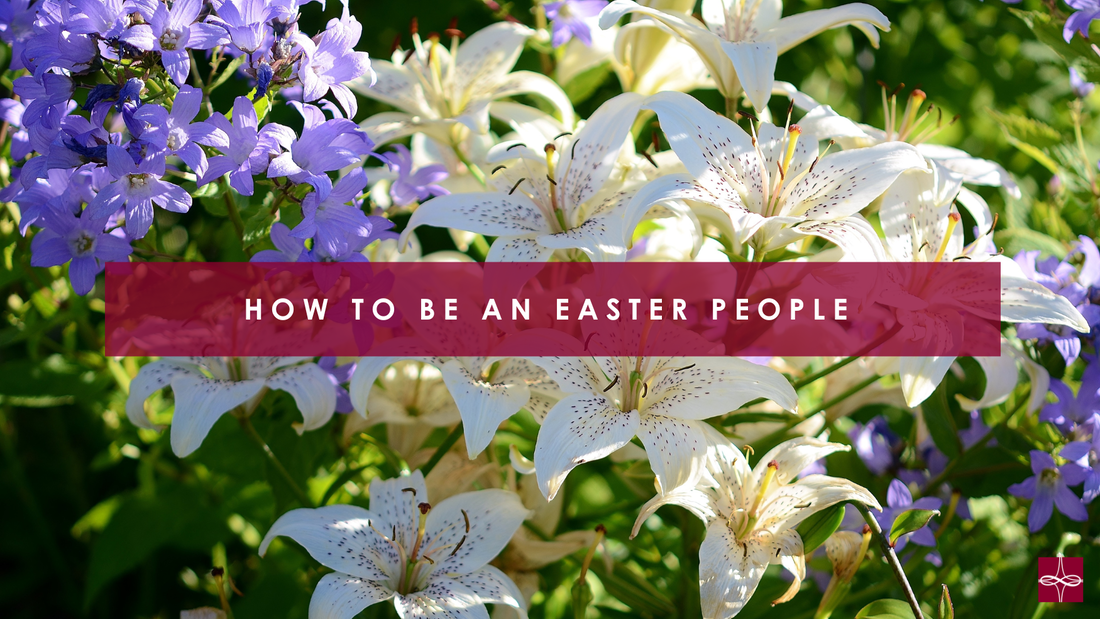

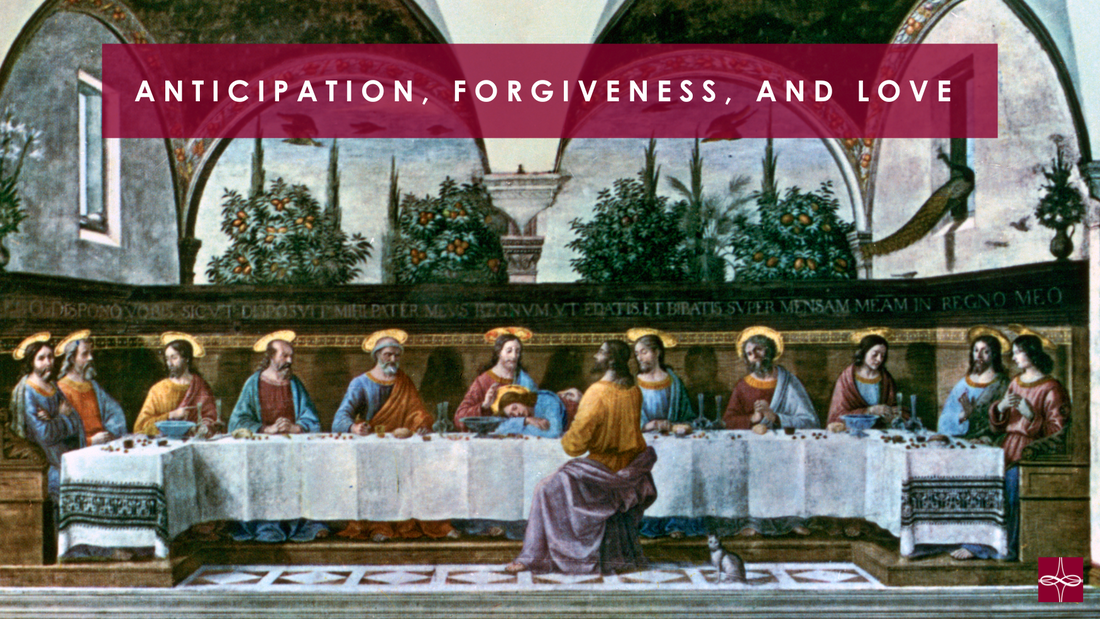

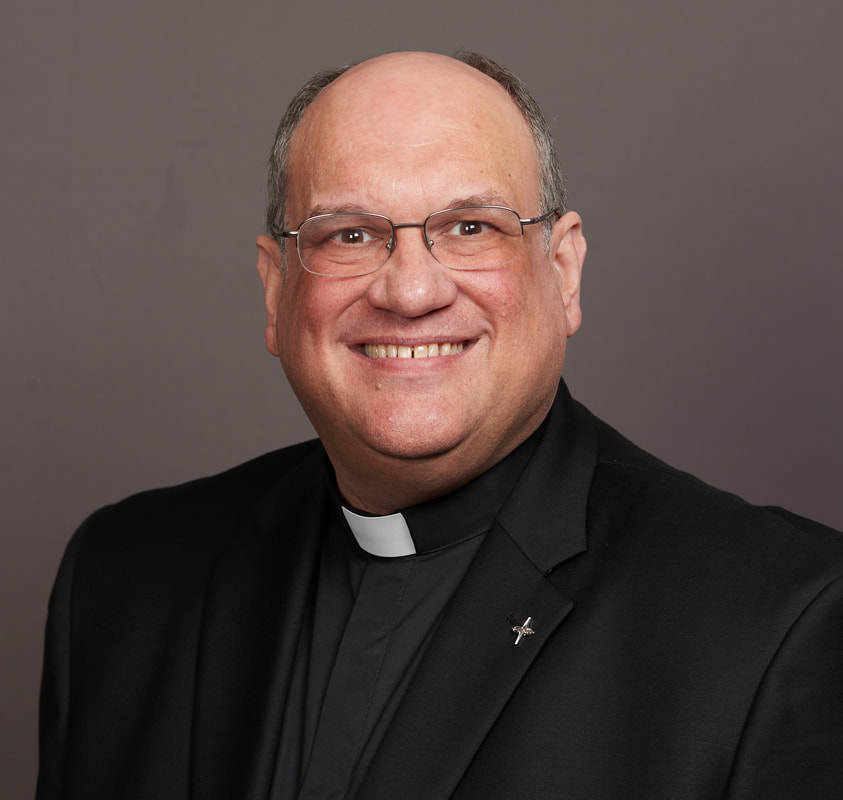
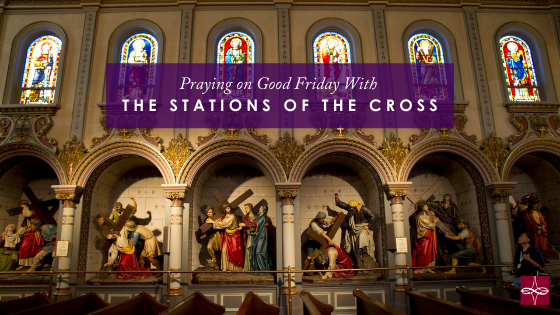

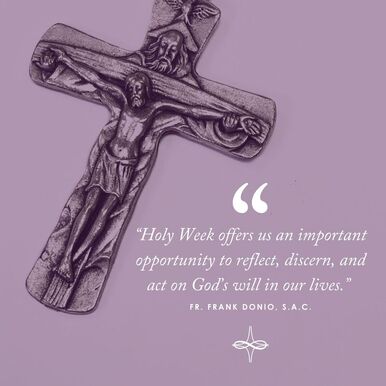
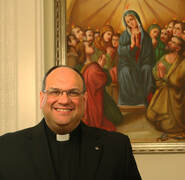
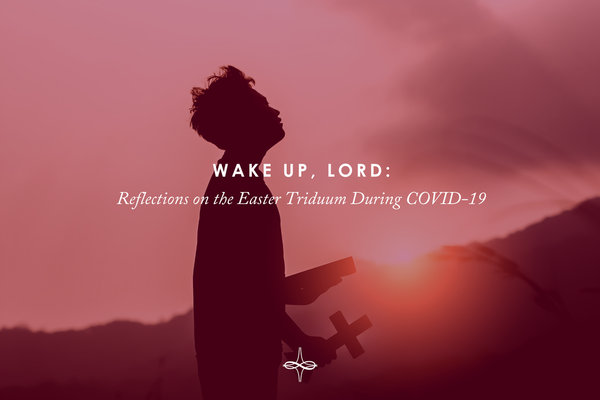

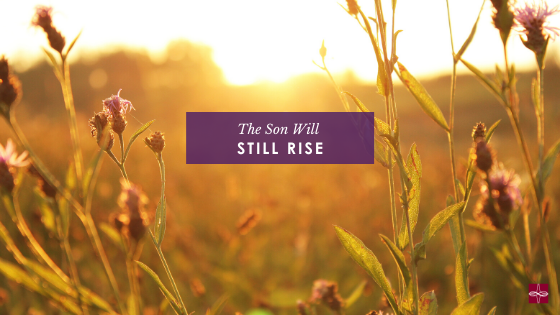

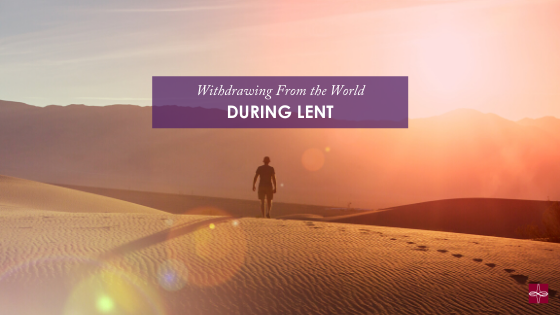

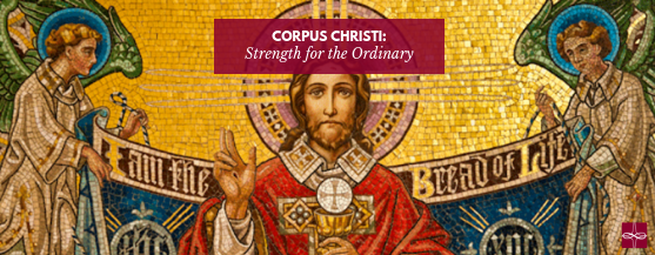

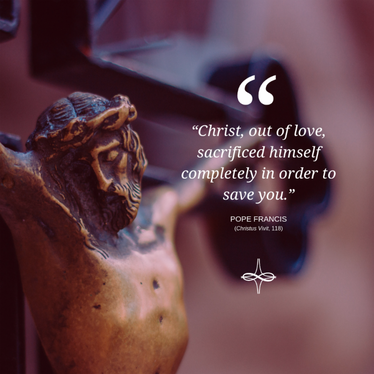
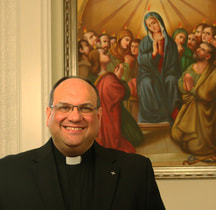
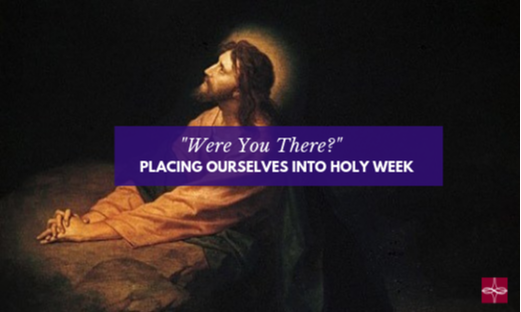

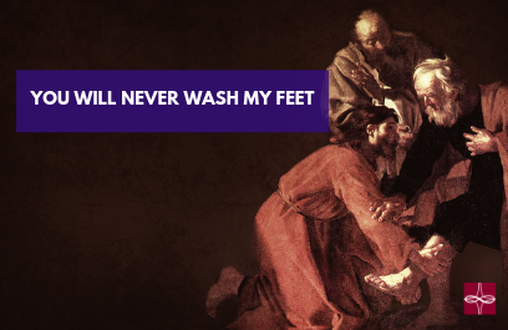

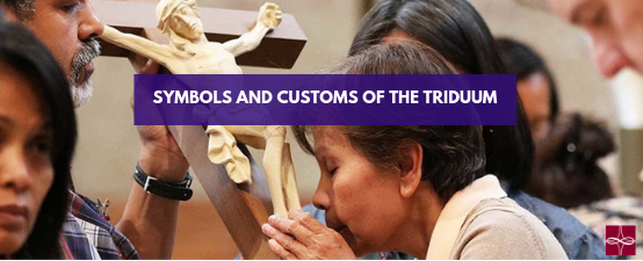



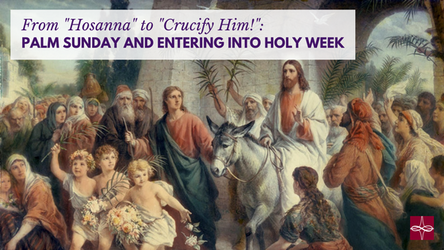

 RSS Feed
RSS Feed